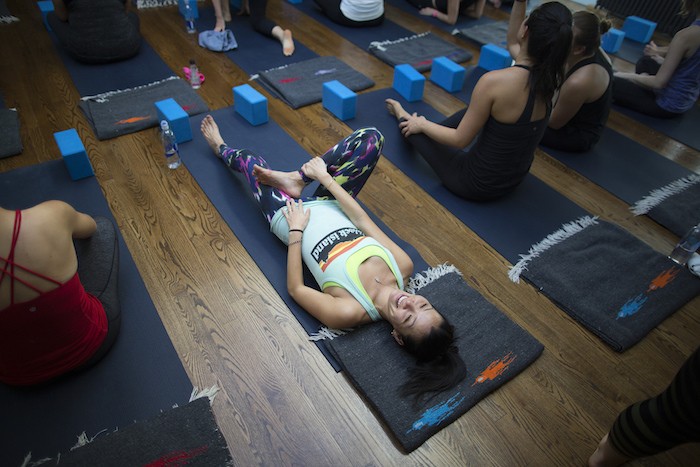The Company That Could Totally Change Boutique Fitness Class Booking
 When you book a Jet Blue flight from NYC to LA, you expect a million factors to affect the price. How far in advance you're booking, for example, and how popular the travel date is. If Jet Blue had a standard NYC to LA rate that never changed, that would be shocking, right?
When you book a Jet Blue flight from NYC to LA, you expect a million factors to affect the price. How far in advance you're booking, for example, and how popular the travel date is. If Jet Blue had a standard NYC to LA rate that never changed, that would be shocking, right?
Dibs is taking that logic and applying it to New York City's boutique fitness industry, with a new platform that uses an algorithm to deliver different prices to those booking the same workouts depending on multiple variables.
AKT in Motion and five other brands (with 20 total studio locations) are currently testing Dibs in beta, and they expect to expand to 20 brands in the next two months.
It's a concept that could really shake up the industry, since until now, studios have set a standard single class price, offering discounts only in special instances and with the purchase of large class packages. And they've had one option to deal with excess inventory (AKA empty spots in classes at less popular times): ClassPass, which pays an incredibly discounted rate for the spots.
"Classpass has a place, but as a studio owner and business owner, you should have multiple sales channels," says Alicia Thomas, Dibs' co-founder with Jina Wye. Thomas was behind former fitness pop-up company Kiwisweat, and while working with trainers and studios in the industry, she says, she realized everyone was having difficulty with pricing.

Thomas says that loyal clients will pay full price and major discount seekers will turn to ClassPass, but there are lots of potential customers in between who aren't being accounted for. "You can really start to address that middle of the population, those people that are maybe thinking 'I’m not a super discount person, but maybe I would like some flexibility in my booking.'"

{{post.sponsorText}}
A studio that charges $32 for a class and is using Dibs, for instance, may charge you $25 for an 11:00 a.m. Tuesday class that is only half full the day before. "We let the studios give us a minimum and maximum, and our algorithm works within that structure...according to real-time demand," she explains. "What we know is how many people are in the class at all times, the speed of booking, the cadence...If there was a snowstorm coming or it was raining like crazy, pricing would be a little less. It’s really adding a layer of sophistication that's kind of unseen in the industry so far."
Since Dibs is just approaching its official launch, there's little evidence of how successful the model will be so far, but Thomas says the company ran a pilot over the summer and saw a more than 50 percent increase in revenue. Borrowing from other industries, again, she also cites the fact that Major League Baseball saw a 30 percent increase in revenue in a year after implementing dynamic pricing. And what better industry than one built on jumping, running, and lifting to make a strategy that's described as dynamic its own? —Lisa Elaine Held
Speaking of fitness economics, ClassPass is now helping studios open new locations, and we've got the scoop, here.
(Photos: Robert Caplin for Well+Good)
Loading More Posts...